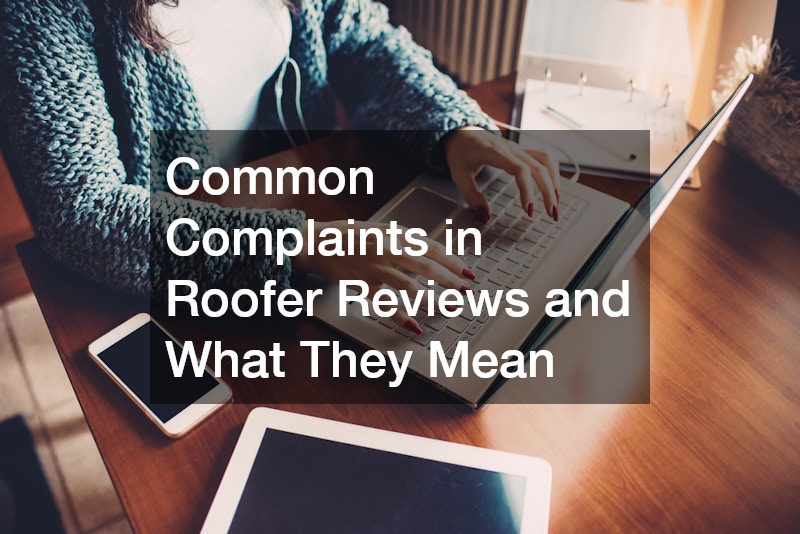Key Takeaways
-
Analyze roofer reviews critically to identify recurring complaints and avoid potential issues.
-
Look for patterns in missed deadlines, hidden costs, and workmanship problems.
-
Verify contractor communication, cleanup practices, and responsiveness to homeowner concerns.
-
Confirm licenses, insurance, and contract details before hiring.
-
Compare multiple roofer quotes alongside reviews to ensure transparency and fair pricing.
-
Contact past clients for references to validate claims in reviews.
-
Prioritize trusted roofers with good reviews who consistently deliver high-quality results.
Selecting the right roofing contractor is one of the most significant home improvement decisions a homeowner can make. A roof protects your home from weather, water damage, and structural issues, and a poorly executed roofing job can result in costly repairs or early replacement. One of the most valuable tools for homeowners researching contractors is online roofer reviews. These reviews provide real-world insight into a contractor’s reliability, quality of work, communication, and professionalism.
However, interpreting roofer reviews can be challenging. Not all feedback is reliable—some may be exaggerated, misleading, or reflect isolated experiences. Recurring complaints, on the other hand, often highlight systemic issues that could impact your project if you hire a contractor without careful consideration. Understanding these patterns is essential for selecting roofers with good reviews and avoiding unnecessary stress or expense.
This article explores the most common complaints found in roofer reviews, explains what they indicate about a contractor’s practices, and provides actionable guidance for homeowners on how to use reviews to identify trusted roofers with good reviews.
Understanding Roofer Reviews
Roofer reviews are evaluations posted online by homeowners who have hired roofing contractors. They can be found on platforms like Google, Yelp, Angi, Better Business Bureau, and social media pages. Reviews range from quick star ratings to in-depth accounts describing the entire project experience, including cost, timeline, and quality of work.
While reviews are informative, they should be read critically. Some negative reviews reflect unrealistic expectations or isolated incidents, while some overly positive reviews may come from incentivized sources. Learning to spot meaningful patterns helps homeowners focus on contractors who consistently perform well.
Key considerations when reading roofer reviews:
-
Look at rating trends: Identify roofers with good reviews over multiple projects rather than relying on a single five-star or one-star rating.
-
Identify recurring complaints: If multiple reviewers cite the same problem, such as delays or hidden fees, it may indicate a systemic issue.
-
Consider detailed vs. brief feedback: Detailed reviews describing project scope, materials, and communication tend to be more reliable than one-line statements.
-
Verify authenticity: Prioritize reviews from verified homeowners or reputable platforms to ensure credibility.
-
Balance with positive feedback: Trusted roofers often have both positive reviews highlighting professionalism and occasional constructive criticism.
By analyzing roofer reviews critically, homeowners can identify trusted roofers with good reviews who are likely to deliver consistent, high-quality results.
Missed Deadlines and Project Delays
Missed deadlines are one of the most frequently cited complaints in roofer reviews. Delays can create scheduling conflicts, additional costs, and even temporary exposure to weather if a roof is left unfinished.
Common causes of project delays:
-
Severe or unexpected weather, including rain, wind, hail, or snow
-
Understaffed crews or inexperienced workers
-
Poor project planning or overbooking by the contractor
-
Supply chain delays for materials, particularly for specialized shingles or tiles
How to interpret these complaints:
-
Look for reviews where delays were repeated across different projects; this often reflects poor scheduling practices rather than an isolated incident.
-
Pay attention to whether contractors communicated delays proactively. Roofers with good reviews typically notify homeowners immediately and provide alternative solutions.
-
Check how the contractor handled the delay: Did they reschedule promptly, adjust labor efficiently, or leave the homeowner waiting without updates?
Tips for homeowners:
-
Request a detailed project timeline, including start and expected completion dates.
-
Ask how the contractor manages unexpected delays and whether they guarantee work completion within a certain period.
-
Contact past clients mentioned in reviews to confirm whether deadlines were consistently met.
Evaluating how contractors handle timing ensures homeowners hire trusted roofers with good reviews who respect schedules and minimize disruptions.
Hidden Costs and Unexpected Fees
Many homeowners report that their final invoice exceeds the original roofer quote. Hidden costs are a significant source of dissatisfaction, as they often appear after the work has begun.
Common hidden costs:
-
Permit or inspection fees not included in the initial quote
-
Roof deck repairs or structural reinforcements discovered during installation
-
Optional upgrades to materials that are unclear in the original quote
-
Dumpster, debris disposal, or post-project cleanup fees
-
Emergency repairs triggered by previously undetected damage
How to avoid surprises:
-
Request fully itemized roofer quotes that include labor, materials, permits, disposal, and optional upgrades.
-
Ask contractors to clarify all potential additional costs before signing a contract.
-
Compare multiple roofer quotes from contractors with good reviews to identify pricing transparency.
-
Include a contingency in your budget to account for unexpected repairs.
Checklist for homeowners:
-
Verify all required permits and inspections are included in the quote.
-
Confirm whether repairs to roof decking or other structural elements are billed separately.
-
Clarify which material upgrades are optional and their costs.
-
Make sure cleanup and debris disposal are factored into the price.
Understanding potential hidden costs allows homeowners to avoid unpleasant surprises and hire highly rated roofing contractors who provide transparent pricing.

Poor Workmanship and Quality Issues
Complaints about workmanship are among the most serious in roofer reviews. Even small mistakes, such as improperly aligned shingles or incomplete flashing installation, can lead to leaks, water damage, and reduced roof lifespan.
Common workmanship issues cited in reviews:
-
Misaligned shingles or tiles
-
Leaks shortly after completion
-
Incorrect or incomplete flashing installation
-
Uneven material application or substandard installation techniques
How to evaluate workmanship complaints:
-
Look for repeated mentions of the same type of problem across multiple reviews, which often indicates systemic issues.
-
Reviews noting prompt resolution of issues are more reassuring than unresolved complaints.
-
Consider the contractor’s experience, certifications, and any industry awards or recognition.
Tips for homeowners:
-
Ask contractors for references and photos of previous projects to verify quality.
-
Confirm warranties for both materials and labor, which indicate confidence in workmanship.
-
Conduct a post-installation inspection to ensure work meets expectations.
Hiring roofers with good reviews and a reputation for high-quality work minimizes the risk of needing costly repairs soon after installation.
Communication Problems
Poor communication is a recurring theme in roofer reviews. Misunderstandings about timelines, materials, or costs can cause frustration and negatively impact project outcomes.
Common communication issues:
-
Contractors not responding promptly to calls, emails, or texts
-
Lack of progress updates during the project
-
Unclear explanations about scope of work or materials
-
Difficulty resolving disputes or misunderstandings
How to assess communication quality:
-
Reviews that emphasize responsiveness and transparency indicate reliable contractors.
-
Repeated complaints about unresponsiveness may signal that communication will be a persistent problem.
Tips for homeowners:
-
Ask how the contractor communicates with clients (phone, email, text, or project management platforms).
-
Request a single point of contact for project updates.
-
Include communication expectations in the contract, such as weekly progress reports or immediate notification of delays.
Trusted roofers with good reviews prioritize clear, timely communication, helping homeowners avoid confusion and frustration.
Cleanup and Post-Project Issues
Cleanup is another area frequently highlighted in roofer reviews. Homeowners often complain about contractors leaving debris, damaging landscaping, or failing to restore the site to its original condition.
Common complaints:
-
Roofing debris left on lawns, driveways, or gutters
-
Damage to plants, fences, or other property
-
Incomplete post-project cleanup or failure to remove old materials
Tips for homeowners:
-
Confirm that debris disposal and cleanup are included in the quote.
-
Ask contractors about their standard cleanup procedures and equipment used.
-
Look for patterns in reviews where multiple homeowners mention post-project issues.
Hiring highly rated roofing contractors who consistently maintain clean work areas reduces stress and protects your property.
Licensing, Insurance, and Contract Issues
Licensing, insurance, and contractual problems are serious concerns reflected in some roofer reviews. Choosing an unlicensed or uninsured contractor exposes homeowners to liability and potential legal or financial issues.
Common complaints:
-
Contractors operating without valid licenses
-
Lack of liability or workers’ compensation insurance
-
Contracts missing critical details like timelines, payments, and warranties
Tips for homeowners:
-
Always verify licenses and insurance coverage before hiring.
-
Ensure contracts outline the scope of work, project schedule, payment terms, and warranty coverage.
-
Check reviews for repeated mentions of licensing or contractual issues.
Selecting contractors with good reviews who are licensed, insured, and transparent about contracts ensures safer, higher-quality roofing projects.
How to Use Roofer Reviews Effectively
While complaints can provide valuable insight, homeowners should use roofer reviews strategically rather than taking every comment at face value.
Strategies for interpreting reviews:
-
Look for recurring patterns, not isolated negative experiences.
-
Balance complaints with positive feedback to get a realistic perspective.
-
Contact past clients referenced in reviews for verification.
-
Combine review insights with quotes, references, and professional verification to make a well-informed decision.
By analyzing roofer reviews critically, homeowners can identify trusted roofers with good reviews who deliver consistent quality and reliability.
Online roofer reviews are an invaluable tool for homeowners seeking reliable, high-quality roofing contractors. Recurring complaints—such as missed deadlines, hidden costs, poor workmanship, communication problems, cleanup issues, and licensing concerns—highlight potential risks. By understanding what these complaints mean and how to interpret them critically, homeowners can avoid problematic contractors and hire trusted roofers with good reviews who provide quality service, clear communication, and transparent pricing.
Combining careful review analysis with detailed quotes, references, and professional verification ensures a smoother, more successful roofing project, protecting both your investment and your home.
